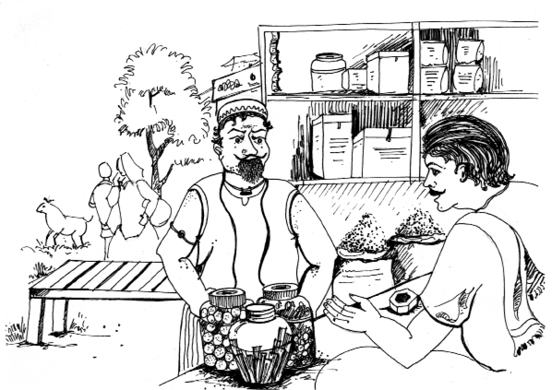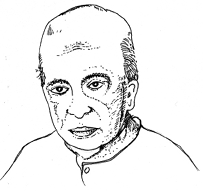Table of Contents
2
A Pair of Mustachios
Guess the meaning of these expressions from the context
nouveau riche commercial bourgeoise
blue blood the bluff of a rascal
asked sourly goods and chattels
There are various kinds of mustachios worn in my country to mark the boundaries between the various classes of people. Outsiders may think it stupid to lay down, or rather to raise, lines of demarcation of this kind, but we are notorious in the whole world for sticking to our queer old conventions, prides and prejudices, even as the Chinese or the Americans or, for that matter, the English… And, at any rate, some people may think it easier and more convenient to wear permanent boundary-lines, like mustachios, which only need a smear of grease to keep them bright and shiny, rather than to wear frock coats, striped trousers and top hats, which constantly need to be laundered and dry-cleaned, and the maintenance of which is already leading to the bankruptcy of the European ruling classes. With them clothes make the man but, to us, mustachios make the man. So we prefer the various styles of mustachios to mark the differences between the classes.
And very unique and poetical symbols they are too. For instance, there is the famous lion moustache, the fearsome upstanding symbol of that great order of resplendent rajas, maharajas, nawabs and English army generals who are so well known for their devotion to the King Emperor. Then there is the tiger moustache, the uncanny, several-pointed moustache worn by the unbending, unchanging survivals from the ranks of the feudal gentry who have nothing left but pride in their greatness and a few mementoes of past glory, scrolls of honour granted by the former emperors, a few gold trinkets, heirlooms and bits of land. Next there is the goat moustache—a rather unsure brand, worn by the nouveau riche, the new commercial bourgeoisie and the shopkeeper class who somehow don’t belong—an indifferent, thin little line of a moustache, worn so that its tips can be turned up or down as the occasion demands—a show of power to some coolie or humility to a prosperous client. There is the Charlie Chaplin moustache worn by the lower middle class, by clerks and professional men, a kind of half-and-half affair, deliberately designed as a compromise between the traditional full moustache and the clean-shaven Curzon cut of the sahibs like them to keep mustachios at all. There is the sheep moustache of the coolies and the lower orders, the mouse moustache of the peasants, and so on.
In fact, there are endless styles of mustachios, all appropriate to the wearers and indicative of the various orders, as rigorously adhered to as if they had all been patented by the Government of India or had been sanctioned by special appointment with His Majesty, the King, or Her Majesty, the Queen. And any poaching on the style of one class by members of another is resented, and the rising ratio of murders in my country is interpreted by certain authorities as being indicative of the increasing jealousy with which each class is guarding its rights and privileges in regard to the mark of the mustachio.
Of course, the analysis of the expert is rather too abstract and not all the murders can be traced to this cause but, certainly, it is true that the preferences of the people in regard to their mustachios are causing a lot of trouble in our parts.
For instance, there was a rumpus in my own village the other day about a pair of mustachios.
It so happened that Seth Ramanand, the grocer and moneylender, who had been doing well out of the recent fall in the price of wheat by buying up whole crops cheap from the hard-pressed peasants and then selling them at higher prices, took it into his head to twist the goat moustache, integral to his order and position in society, at the tips, so that it looked nearly like a tiger moustache.
Nobody seemed to mind very much because most of the mouse-moustached peasants in our village are beholden to the local moneylender, either because they owe him interest on a loan, or an instalment on a mortgage of jewellery or land. Besides, the Seth had been careful enough to twist his moustache so that it seemed nearly, though not quite, like a tiger moustache.
But there lives in the vicinity of our village, in an old dilapidated Moghul style house, a mussulman named Khan Azam Khan, who claims descent from an ancient Afghan family whose heads were noblemen and councillors in the court of the great Moghuls. Khan Azam Khan, a tall, middle-aged man, is a handsome and dignified person, and he wears a tiger moustache and remains adorned with the faded remnants of a gold-brocaded waistcoat, though he hasn’t even a patch of land left.
Some people, notably the landlord of our village and the moneylender, maliciously say that he is an impostor, and that all his talk about his blue blood is merely the bluff of a rascal. Others, like the priest of the temple, concede that his ancestors were certainly attached to the Court of the Great Moghuls, but as sweepers. The landlord, the moneylender and the priest are manifestly jealous of anyone’s long ancestry, however, because they have all risen from nothing—and it is obvious from the stately ruins around Khan Azam Khan what grace was once his and his forefathers. Only Khan Azam Khan’s pride is greatly in excess of his present possessions and he is inordinately jealous of his old privileges and rather foolish and headstrong in safeguarding every sacred brick of his tottering house against vandalism.
Khan Azam Khan happened to go to the moneylender’s shop to pawn his wife’s gold nose-ring one morning and he noticed the upturning tendency of the hair on Ramanand’s upper lip which made the moneylender’s goat moustache look almost like his own tiger moustache.
‘Since when have the lentil-eating shopkeepers become noblemen?’ he asked sourly.
‘I don’t know what you mean, Khan’, Ramanand answered.
‘You know what I mean, seed of a donkey!’ said the Khan. Look at the way you have turned the tips of your moustache upwards. It almost looks like my tiger moustache. Turn the tips down to the style proper to the goat that you are! Fancy the airs of people nowadays!’
‘Oh, Khan, don’t get so excited,’ said the moneylender, who was nothing if he was not amenable, having built up his business on the maxim that the customer is always right.
‘I tell you, turn the tip of your moustache down if you value your life!’ raged Khan Azam Khan.

‘If that is all the trouble, here you are’, said Ramanand, brushing one end of his moustache with his oily hand so that it dropped like a dead fly. ‘Come, show me the trinkets. How much do you want for them?’
Now that Khan Azam Khan’s pride was appeased, he was like soft wax in the merchant’s sure hand. His need, and the need of his family, for food, was great and he humbly accepted the value which the moneylender put on his wife’s nose-ring.
But as he was departing, after negotiating his business, he noticed that though one end of the moneylender’s moustache had come down at his behest, the other end was still up.
‘A strange trick you have played on me, you swine,’ the Khan said.
‘I have paid you the best value for your trinket, Khan, that any moneylender will pay in these parts,’ he said, ‘especially in these days when the sarkars of the whole world are threatening to go off the gold standard.’
‘It has nothing to do with the trinket,’ said Azam Khan, ‘but one end of your moustache is still up like my tiger moustache though you have brought down the other to your proper goat’s style. Bring that other end down also so that there is no aping by your moustache of mine.’
‘Now Khan,’ said the moneylender, ‘I humbled myself because you are doing business with me. You can’t expect me to become a mere worm just because you have pawned a trinket with me. If you were pledging some more expensive jewellery I might consider obliging you a little more. Anyhow, my humble milk-skimmer doesn’t look a bit like your valiant tiger moustache.’
‘Now, be sensible, Khan,’ the moneylender said, waving his hand with an imperturbable calm.
‘I tell you, turn that tip down or I shall wring your neck,’ said the Khan.
‘All right, the next time you come to do business with me, I shall bring that tip down,’ answered the moneylender cunningly.
‘That is fair,’ said Chaudhary Chottu Ram, the landlord of the village, who was sitting under the tree opposite.
‘To be sure! To be sure!’ some peasants chimed in sheepishly.
Khan Azam Khan managed to control his murderous impulses and walked away. But he could not quell his pride, the pride of generations of his ancestors who had worn the tiger moustache as a mark of their high position. To see the symbol of his honour imitated by a moneylender—this was too much for him. He went home and fetched a necklace which had come down to his family through seven generations and, placing it before the moneylender, said:
‘Now will you bring that tip of your moustache down?’
‘By all means, Khan,’ said the moneylender. ‘But let us see about this necklace. How much do you want for it?’
‘Any price will do, so long as you bring the tip of your moustache down,’ answered Azam Khan.
After they had settled the business, the moneylender said: ‘Now Khan, I shall carry out your will.’ And he ceremoniously brushed the upturned tip of his moustache down.
As Azam Khan was walking away, however, he noticed that the other tip of the moneylender’s moustache had now gone up and stood dubiously like the upturned end of his own exalted tiger moustache. He turned on his feet and shouted:
‘I shall kill you if you don’t brush that moustache into the shape appropriate to your position as a lentil-eating moneylender!’
‘Now, now, Khan, come to your senses. You know it is only the illusion of a tiger’s moustache and nowhere like your brave and wonderful adornment,’ said the greasy moneylender.
‘I tell you I won’t have you insulting the insignia of my order!’ shouted Azam Khan. ‘You bring that tip down!’
‘I wouldn’t do it, Khan, even if you pawned all the jewellery you possess to me,’ said the moneylender.
‘I would rather lose all my remaining worldly possessions, my pots and pans, my clothes, even my house, than see the tip of your moustache turned up like that!’ spluttered Azam Khan.
‘Achcha, if you care so little for all your goods and chattels you sell them to me and then I shall turn that tip of my moustache down,’ said the moneylender. ‘And what is more, I shall keep it flat. Now, is that a bargain?’
‘That seems fair enough,’ said the landlord from under the tree where he was preparing for a siesta.
‘But what proof have I that you will keep your word?’ said Azam Khan. ‘You oily lentil-eaters never keep your promises.’
‘We shall draw up a deed, here and now,’ said the moneylender. ‘And we shall have it signed by the five elders of the village who are seated under that tree. What more do you want?’
‘Now, there is no catch in that,’ put in the landlord. ‘I and four other elders will come to court as witnesses on your behalf if he doesn’t keep his moustache to the goat style ever afterwards.’
‘I shall excommunicate him from religion if he doesn’t keep his word,’ added the priest, who had arrived on the scene on hearing the hubbub.
‘Achcha,’ agreed Azam Khan.
And he forthwith had a deed prepared by the petition writer of the village, who sat smoking his hubble-bubble under the tree. And this document, transferring all his household goods and chattels, was signed in the presence of the five elders of the village and sealed. And the moneylender forthwith brought both tips of his moustache down and kept them glued in the goat style appropriate to his order.
Only, as soon as Khan Azam Khan’s back was turned he muttered to the peasants seated nearby: ‘My father was a Sultan.’
And they laughed to see the Khan give a special twist to his moustache as he walked away maintaining the valiant uprightness to the symbol of his ancient and noble family, though he had become a pauper.
About the Author

Mulk Raj Anand (1905–2004), one of the most celebrated Indian novelists who wrote in English, was born in Peshawar and educated at the universities of Lahore, London and Cambridge.
His novels include The Untouchable, Coolie, The Sword and the Sickle, Private Life of an Indian Prince, Seven Summers and Morning Face. He also published a number of short stories which reveal a lively sense of humour, a keen eye for the pretensions of the people and a feeling of warm compassion.
Understanding the Text
1. What do you understand of the natures of Ramanand and Azam Khan from the episode described?
2. Identify instances in the story that show the business acumen of Ramanand.
3. Both Ramanand and Azam Khan seem to have very fixed views. How does Ramanand score over Azam Khan towards the end of the story?
Talking About the Text
Discuss the following in groups of three or four
1. The episode has been narrated in a light vein. What social mores does the author seem to ridicule?
2. What do you think are the reasons for the references made to the English people and the British monarchy?
3. What do you think is the message that the author seems to convey through the story?
Compare your group’s views with that of the other groups.
Appreciation
1. Comment on the way in which the theme of the story has been introduced.
2. How does the insertion of dialogue in the story contribute to its interest?
Language Work
1. Nouveau riche and bourgeoise are French words. Collect from newspapers, magazines and other sources some more French words or expressions that are commonly used in English.
2. Locate expressions in the text which reflect the Indian idiom, for example, the pride of the generations of his ancestors.
3. We ‘draw up a deed’. Complete the following phrases with appropriate words
a. ………….. one’s word b. …………….. one’s will
c. …………… ends meet d. …………….. a loan
e. …………….a deaf ear to
Suggested Reading
1. The Barber’s Trade Union and Other Stories by Mulk Raj Anand.
Read and Enjoy
May the Best Beard Win
HANDLEBAR HEROES: There were men with Fu Manchu moustaches and contestants with long flowing Gandalf beards.
Some 220 contestants from all over the world have gathered in Berlin for Saturday’s biannual world beard and moustache championships.
THE WACKIER THE BETTER: German Elmar Weisser supports a Brandenburg Gate on his chin. Countryman Juergen Reinl’s spikes give porcupines a complex. And, finally, grandpa Willi Chevalier is in a class of his own.
BUT BEAT THIS SANTA : Entrants in the freestyle section turned up with Christmas tree beards.
From the Hindustan Times, 2-10-05.
